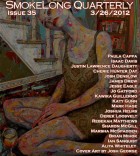What inspired you to write this story?
It was a riff that came to me while I was walking to the coffee shop. There’s a scene in Roberto Bolano’s The Savage Detectives where a poet makes a claim that every poet is either a faggot or a queer, and he goes on listing poets for pages, some of whom are butches, sissies, fairies, freaks, and by the end seems to have forgotten the point he wanted to make, if he ever wanted to make a point at all. I wanted to have a scene sort of like that, full of pseudo-highbrow (or ridiculous) discussion of poets that most readers would know by name, a totally improbable conversation that at the same time I could fully imagine happening if you got together enough belligerent young poets in some bar or cafe. It was inspired by stories I’ve heard about groups of writers who play silly little games when they’re out together, and silly riffs that I’ve gone on with friends, where we talk about things like, I don’t know, a hypothetical meeting between Salvador Dali and Andy Warhol, or if Robert Oppenheimer had met with Genghis Khan.
This is a stand-alone piece that has been taken from a larger work titled “The Game of Surrounding.” Tell me about this larger story. How does this stand-alone segment fit?
“The Game of Surrounding” is a novel I’m working on, which continues to collect more titles as it goes along. It’s now called “The Game of Surrounding or Women Who Sing Songs About the End of the World.” The first title refers to the game Go, which was going to be a major structural device in the book, but which I’ve more or less abandoned by now. The translation of the Chinese name for the game Go is “board game of surrounding,” and the book is all about surrounding every piece of knowledge, understanding, experience, etc. with other, contradictory pieces of knowledge, understanding, experience. It’s about seeing patterns where none actually exist, and disbelieving true patterns because of exceptions to the rule. It’s an epistemological mess for the neurotic and self-absorbed. The second title refers to a character in the book that the narrator is in love with, and also obliquely to the original Swedish title of The Girl with the Dragon Tattoo, which was Men Who Hate Women. I guess I’d say the book is about boys who think they can win and keep girls using poetry, while acting in fairly reprehensible ways all the while. It’s also about the narrator’s desire to remove the self from the poem and the story, to achieve a kind of language resembling zen, or death. He spends his summer reading the Bhagavad Gita, eventually takes LSD, has a nervous breakdown, and is visited in the psych ward by a man from the future, or someone he calls the man from the future. This excerpt comes very early in the novel, and is meant to mythologize the man from the future, or perhaps to make a parody of his myth. I’m not really sure.
“Ezra Pound’s usually all right to talk about.” How do you think he’d feel about this, if he happened to travel into the future and hear all these poets talking?
I have not actually read all that much of Ezra Pound’s poetry, but what I have read I was not particularly struck by. I have a book by him called Guide to Kulchur, which I’ve flipped through, and I respect him as an iconoclast. What I know best about Ezra Pound is that he was key in advancing the careers of other poets, and key in the advance of modernism over poetry. He was responsible for the publication of “Prufrock” in Poetry Magazine, and I wonder what “The Waste Land” would have looked like without his influence. To me, Pound is more like a curtain over modern poetry, or the man lifting the curtain to reveal modern poetry, than a brilliant modern poet. I have no idea how he’d feel to hear all these poets talking like this. He might tell them they’re all still mired in the old modernism, or in post-modernism now, he might tell them they need to move things forward again. Or he might feel right at home, coming from the past, he might even feel a little behind the times. There’s a line from Bob Dylan that I always remember, in “Desolation Row,” where he says, “And Ezra Pound and T.S. Eliot/Fighting in the captain’s tower.” I think Ezra Pound, for all his influence, for his generosity, and for his own production of poetry, stands above anyone else in the captain’s tower of modernism. Which is why he’s usually all right to talk about.
Tell me about the secret longing behind this shaggy dog joke. How do you think, as both writers and readers, we are fueled by longing?
I think the longing is something that most creative people share, that most people in general share, that the hip, aloof artist or writer doesn’t want to wear on his sleeves, or even admit to having: a longing for success, for recognition. A longing to see success realized, to be recognized during one’s lifetime, even if only by peers that you respect, but preferably by the critical establishment, by the public. But when you’re younger, I think, and you’re a writer, and maybe you’ve been reading Rimbaud, or maybe you’ve just discovered Roberto Bolano, you can get drunk on the notion of obscurity, disappearance, no success like failure, an early death in an unmarked grave. You can get lost in the myth of the poète maudit if you’re not careful. But who wouldn’t really let go of that if they were offered publication in The New Yorker or The Paris Review, if New Directions or City Lights or Doubleday offered to publish their book of poems? Who wouldn’t really want to win the Yale Younger Series of Poets Award, who would turn down a Pushcart Prize or a Frost Medal? The longing for success is really not such a secret, but these poets that I’m writing about want to keep it a secret, they’d rather seem aloof from their own work than attached to it, aloof from their own lives than attached to them. I think that readers are probably driven by a longing to identify with a piece of literature, and writers long to identify with what they write, and with their readers as well. But it’s a secret, and we hide it with irony, we hide it with disdain, we hide it by telling jokes.



 The core workshop of SmokeLong Fitness is all in writing, so you can take part from anywhere at anytime. We are excited about creating a supportive, consistent and structured environment for flash writers to work on their craft in a community. We are thrilled and proud to say that our workshop participants have won, placed, or been listed in every major flash competition. Community works.
The core workshop of SmokeLong Fitness is all in writing, so you can take part from anywhere at anytime. We are excited about creating a supportive, consistent and structured environment for flash writers to work on their craft in a community. We are thrilled and proud to say that our workshop participants have won, placed, or been listed in every major flash competition. Community works.